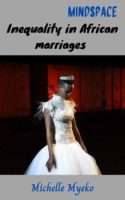There are lots of beautiful features of an African marriage. Marriage in the African context extends beyond the union of a single man and a single woman. A marriage links two families together. Even before the marriage, couples involve their families. Often uncles are the first ones to know about a young man’s intention to ask for a hand in marriage. This alerting of adults is important because no couple exists in a vacuum; the marriage becomes part of the clan and then the bigger community. Children produced in most African marriages have wide access to parental figures, for example, your father’s younger brother is called “Tat’omncinci” in isiXhosa which literally means younger father. Your mother’s older sister is literally called older mother (Mam’omkhulu). Because language creates reality in traditional African societies, there were no such places as orphanages because in the unfortunate event of a mother passing away, you would have all these other mothers ready to take center stage in nurturing.
African weddings are wonderful, sumptuous affairs that can last for days. In fact most traditional weddings happen over two days. The first day is the fetching of her bride from her home where there will be celebrations there, with everyone invited and gifts exchanged with the extended family. The second day of the wedding occurs in the groom’s family, the bride’s new home, where she is welcomed into the fold.
I have some issues though with some aspects of African traditional weddings. For one, I feel lobola should be scrapped completely. In this patriarchal world, men who have to “pay” to get a wife may harbour this entitled ownership and start to view their wives as acquired property. No one wants to feel like they’re bought and paid for. I get that lobola started as a safety check in a bygone era. A young man had to prove his ability to materially take care of a new family, by giving the bride’s family a herd of cattle as a demonstration of his financial means. This was in the age where the majority of women worked from home and were totally dependent on the economic power of the men. Lobola has become unnecessary because women aspire to independence. Most women work outside of the home, earning their own money and no one needs to prove that they can take care of them because they are just as capable, just as bright and just as ambitious.
These days when a young woman’s family has received lobola, the groom’s family develops an expectation of servitude from her because she has been “paid for”. She is expected to behave as a housekeeper who cooks, cleans, scrubs, polishes, not only for him and their nuclear family, but for his extended family too. I have personal experience with this. I remember being a young bride with small children and a fulltime job while studying part time. We would go over to my husband’s family for holidays and it was known that this was the commencement of the “daughter in-law Olympics.” In this context all the daughters-in-law of that family were pitted against each other. We were expected to out-clean, out-cook, and out-scrub each other. And if you ever expressed tiredness then comments would be made about how they had squandered their lobola on you as if you were some malfunctioning appliance. The giving of money to the bride’s family creates a power imbalance, in fact, it exacerbates the existing unequal power dynamic between men and women.
With lobola a man becomes the buyer, the customer who is always right and the woman becomes the commodity. I am Xhosa and in my culture a woman, once married, gets a completely new identity. I do not mean this in a way that a Miss becomes a Mrs and takes on the husband’s name, but a Xhosa bride gets a brand new first name. Her husband’s family renames her. So if for example, she is called “Mary Lamb” before marriage, and falls in love with “David Wolf” she would be called “Dorothy Wolf”. This complete overhaul of identity is unfair on women. It takes so much for each person to come into their being and the changing of this with the two words “I do” seems bizarre and wrong to me. During the marriage ceremony in an African wedding, the bride is taken to a room with women belonging to the family she is being married into. In this room she gets instructed on virtually how to be a doormat. I have sat through such a talk and most women stand up and teach you silence. You are taught never to question your husband’s decisions, never to contradict him, to always accept his leadership and his decisions. You are told never to question him on his comings and goings. This mute version of you is apparently supposed to be the glue that will hold the marriage together. Strangely enough, grooms never get pulled aside to get lectures on how to be husbands. It is assumed that because they are male, they have all the answers.
Marriage can be a beautiful institution but any culture that promotes inequality is destined to make the marriage collapse. Men and women should always come into the marriage whole; there should not be the one who is paying and the one who is bought. There are multiple ways to bring families together without including the purchase of spouses.
***
Do you think it’s correct to speak ill of the dead? Read one writer’s opinion here
Tell us: Do you think that some customs in traditional African marriages are unequal? Why?


